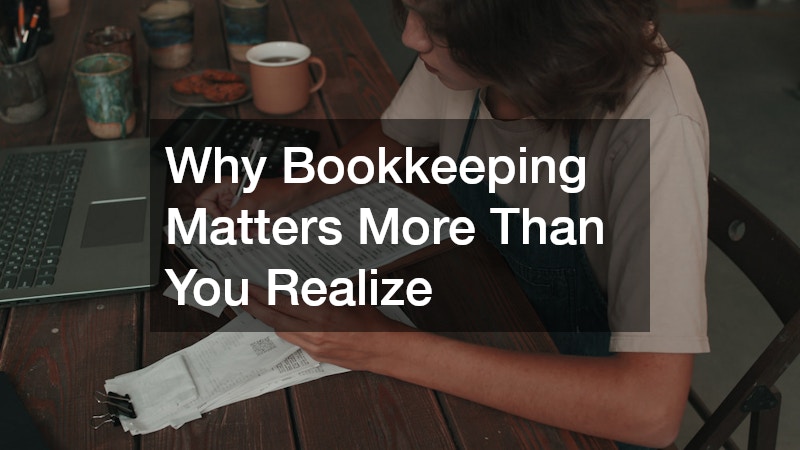

Every successful business has a firm grip on its finances, and behind that control is often a reliable bookkeeper. While some business owners may view bookkeeping as a simple task of tracking expenses and reconciling bank accounts, the reality is that a skilled bookkeeper does far more. They serve as financial translators, operational support systems, and silent growth drivers.
This article explores the strategic value of bookkeepers and how their contributions go beyond mere number-crunching. Whether you’re a startup or a growing enterprise, understanding what a bookkeeper truly does can help you leverage their full potential.
Why Bookkeeping Matters More Than You Realize

For many business owners, bookkeeping may seem like a behind-the-scenes task, important, but not necessarily a driver of growth. However, accurate bookkeeping is foundational to every informed business decision. Without up-to-date records, cash flow forecasting, budgeting, and long-term planning become guesswork.
Bookkeepers ensure that your financial data is reliable and organized. That means you’re not just compliant at tax time; you’re also prepared to make decisions about hiring, expansion, pricing, and more. In short, bookkeeping doesn’t just keep you in business—it helps your business grow.
Here’s a deeper look at how bookkeepers add strategic value.
What Does a Bookkeeper Do to Help Your Business Grow?
Bookkeepers are responsible for maintaining accurate and up-to-date financial records, but their impact doesn’t stop there. Their work supports business growth in both direct and indirect ways.
Here’s how a bookkeeper contributes to business growth:
- Financial clarity: With accurate records, business owners gain insight into what’s working and what’s not. Clear reports lead to better decisions.
- Cash flow tracking: A bookkeeper can identify where money is coming from and going to, which helps you maintain a healthy cash flow, critical for scaling.
- Expense management: By categorizing and tracking spending, bookkeepers can pinpoint areas where you may be overspending.
- Budget planning: Bookkeepers help develop budgets based on real data, giving you realistic targets for growth.
- Timely reporting: Monthly and quarterly reports help you measure growth progress and prepare for upcoming investments or cost adjustments.
- Compliance and tax readiness: Accurate books make tax time easier, avoiding penalties and allowing for strategic deductions.
Bookkeepers don’t just record transactions—they create the foundation for smarter growth.
How Bookkeepers Support Better Decision-Making
Every business decision—from hiring to marketing—requires an understanding of your financial position. Bookkeepers offer that clarity. They generate detailed reports that reflect income, expenses, liabilities, and profitability.
Without this insight, you may base decisions on gut instinct rather than data. That’s risky. With a bookkeeper’s help, you can:
- Decide when to scale operations or hire new employees
- Set product or service pricing with confidence
- Apply for loans with the correct documentation
- Understand the financial impact of business goals
Essentially, bookkeepers help turn financial data into actionable business intelligence.
Are You Missing Growth Opportunities Without a Bookkeeper?
You might think you’re saving money by managing your books yourself or using basic software. But poor or delayed bookkeeping can lead to costly mistakes.
Without proper support, you might:
- Miss tax deadlines and face penalties
- Underestimate your business expenses
- Make decisions based on outdated financial data
- Overlook cash flow shortages until it’s too late
A professional bookkeeper helps prevent these issues by offering consistency, accuracy, and structure.
If you’re serious about growth, investing in a bookkeeper is not a cost—it’s a strategic asset.
Bookkeeper Duties and Responsibilities: More Than Data Entry
Many people associate bookkeeping with entering receipts and reconciling statements. While these are important, the full scope of bookkeeper duties and responsibilities goes much deeper.
Bookkeepers also:
- Set up and manage financial systems tailored to your business
- Assist with payroll and vendor payments
- Ensure compliance with tax codes and financial regulations
- Flag discrepancies or financial red flags early
- Coordinate with accountants during tax season or audits
Their support ensures that your business runs smoothly and avoids financial blind spots.
When Should You Hire a Bookkeeper?

If you’re spending more time managing receipts than running your business, it’s time to delegate. But even early-stage businesses benefit from bookkeeping.
Here are signs you need a bookkeeper:
- You’re falling behind on financial recordkeeping
- Your cash flow is unpredictable
- You’re preparing to scale your business
- You struggle with budgeting or forecasting
- You’re not sure how profitable you really are
Hiring a bookkeeper early sets your business up for structured and sustainable growth.
Final Thoughts: A Bookkeeper Is a Growth Partner
Bookkeepers aren’t just record keepers—they are strategic partners. Their skills in organizing, analyzing, and reporting your finances provide clarity that empowers growth. By understanding where your money goes and how it works for you, you’re equipped to lead your business forward.
Whether you’re looking to expand, invest, or simply gain better control of your finances, a good bookkeeper will guide you through that journey with confidence and precision.

